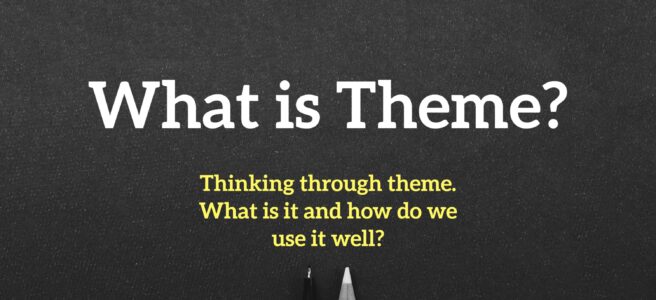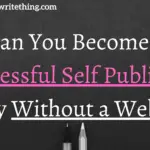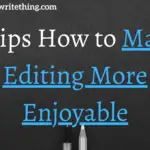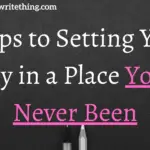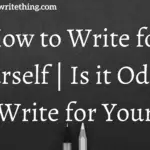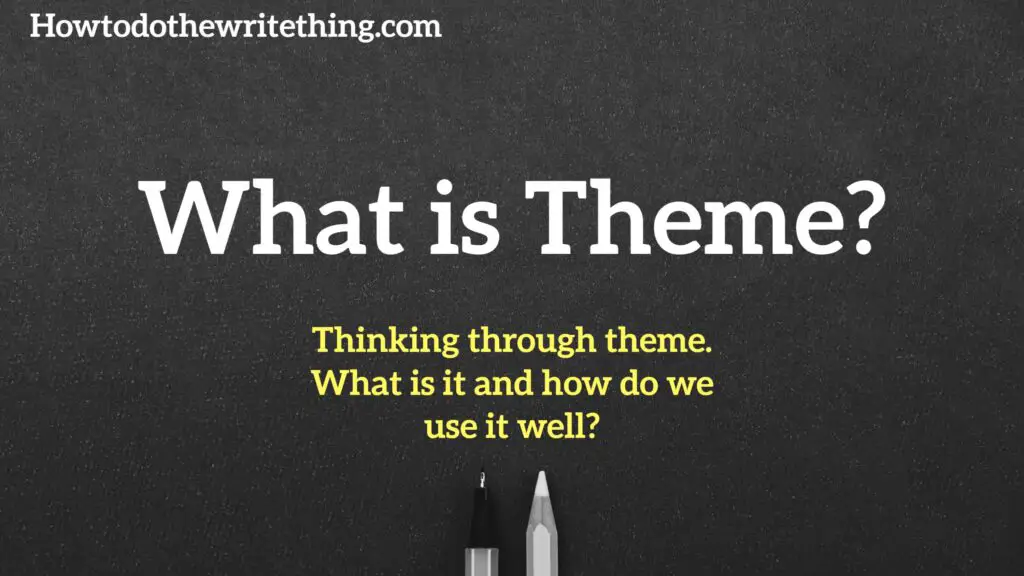
What is Theme?
When someone tells you they have written a story or book almost instantly you might say something like, “Cool! What is it about?”
This is the major reason for having a theme, but what is theme?
Understanding an author’s theme can be paramount to understanding why the author wrote it. Knowing the theme is not totally necessary for enjoying the story first hand, but it may give the book layers that become fascinating for readers and turn them into fans.
The theme may come with ideas like ‘man’s inhumanity to man’ or ‘love’s fatal betrayal’ or ‘environment’ or ‘self-sacrifice and redemption.’ It could be any big broad idea that the writer cares about and wants to share within the context of their story.
If your story does not have this overarching major idea then at some point the reader may become bored with your story and move on.
Definition of Theme
The simplest definition of theme is this:
“Theme is defined as a main idea or an underlying meaning of a literary work, which may be stated directly or indirectly.” – Source
Don’t Confuse the Theme with the subject. It can be easy to do.
How to separate the Subject from the Theme:
“Subject is a topic that acts as a foundation for a literary work, while a theme is an opinion expressed on the subject.” – Source
For example: The subject of your story may be romance and young love, but your theme may be the opinion that “it is better to have loved and lost than to never have loved at all” – Thank you Shakespeare.
So be sure not to get these two muddled up or it could become confusing for yourself and your reader what you are trying to accomplish.
How do we as a writer come up with our theme?
What is Theme?
Coming up with a theme and themes does not have to be difficult. I would venture to say that we personally must have a vested interest in the theme.
A vested interest means we care about the topic. We want to see how it plays out for ourselves. And we want our reader to see the problem and how we have thought through it and the conclusion we came to.
The reader does not have to agree with our opinion of the theme, but we do want them to think about it in a similar pattern that we have.
You may have personally experienced heartbreak in your life. This might lead you to write a tragic love story that eventually ends in death, turmoil, or breakup. The theme you may be thinking might be something like, “All love ends in heartache.”
On the reverse you may have experienced heartache, but you still believe in love so you write a story about love and romance. In the end they breakup but it’s for the best because they weren’t meant for each other and their true love is still out there. Your theme might be that, “love is still worth the heartache.”
Again no one reading your story has to agree with you in order to enjoy your story, but discovering your background to the inspiration of your story later on will show them the depth of your thoughts and give your story more power to cause emotions in the reader.
So my best advice about finding a theme for your story is to find it in real life. It doesn’t have to personally be your life. It could be a story your family member or friend went through. You could find inspiration from talking to a stranger on a plane.
Where the story comes from is not as important as how you write it and the theme you derive from it. Try to find your theme and try to make sure it is one that you are at least somewhat passionate about or you might lose interest after writing 100 pages.
Major and Minor Themes
Themes can be broad and general and they can also be small and detailed. This can make a difference between major and minor themes.
Your major theme might be “man’s inhumanity to man.” Thus in your book your main problem would deal with this theme and it would be repeated throughout the story as the major dealt with the problem and theme.
In a story where your major theme is “man’s inhumanity to man” your minor themes might be that “good still exists,” “one person’s decisions affect many,” and “you reap what you so.”
You can see how these minor themes will easily coexist in a story with our major theme.
What is Theme?
Enjoying What is Theme? Take a moment and consider sharing this social-friendly image to say thanks and feel free to comment with your thoughts below! 🙂
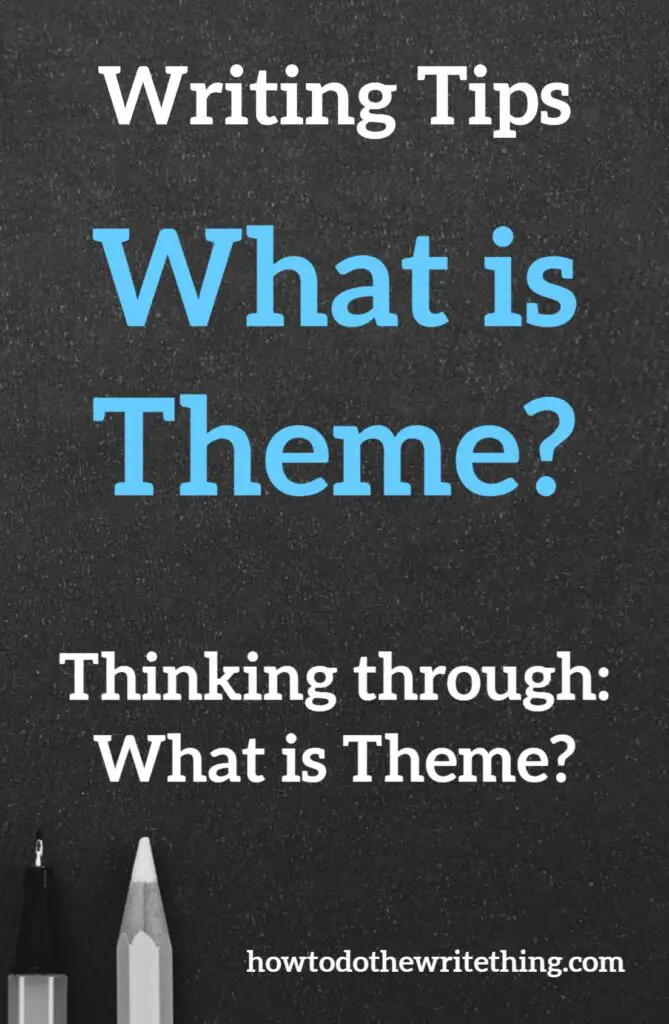
What is Theme?
And a brief intermission from What is Theme, for our commercials:
Need a Cheaper Plan? Try DreamHost.
If you enjoy What is Theme, storytelling, and writing in general, you might love owning a domain of your own where you can write about it? Ever want to own your own domain name (Yourname.com)?
Bluehost hosts your blog so that you can own your domain and make money blogging. Check them out only if you’re interested in making money blogging; otherwise, go for a free blog instead 🙂
Try Grammarly, The Free tool that should be in every writer’s toolbelt.
What is Theme?
Check this out.
And now back to, What is Theme?
How do we as the writer present the theme?
There are a million ways to go about relaying our theme to our reader. So you as the writer get to be creative about how you want to share your theme with your audience.
Some ways to try to show your theme:
- Have your character say it in dialogue.
- It will bleed through your story.
- The feelings of the main character.
- The thoughts of the main character.
- The circumstances characters find themselves in.
- The major climax.
- The resolution.
- Conversations of multiple characters.
- Laws of the land.
- Actions in the plot.
- Events in the plot.
- Reactions of characters to their given circumstance.
- What they say in response to being faced with the truth of the theme.
- Etc.
An example might be that your character is headed to the grocery store minding their own business when they get pulled over and the officer tells them to get out of the car for no perceivable reason.
Your character might say something like, “This is ridiculous. There is no reason I should get out of my car.” This in effect is you creating a scenario where you showed the reader that the circumstance the character finds herself seems unfair and then when she voices that it is ridiculous it solidifies the truth that something is wrong here.
Now if the officer searches the car and finds drugs then you may have justified the officer’s actions in the reader’s mind. The minor theme might be that “all people are hiding something.”
On the other hand you may have the innocent woman hauled off to jail for absolutely nothing and have maybe stated a minor theme that “the police are corrupt.”
So you may write these stories with intent of expressing themes like this or you may even create them without meaning to. What we know for certain is that themes do exist and you should do your best to create them and present them creatively and thoughtfully within your narrative.
You can always very simply explain your theme in a letter or note to the reader in the preface or end of the book if you feel that they will get more depth out of it or will enjoy reading more knowing why you wrote it and what you are trying to show.
What’s the Point of the Theme?
The simple point of thinking about themes and doing the extra work of creating them and weaving them into your story is to communicate ideas through your story.
You may want the reader to understand how you view the world. Or you might want them to understand the pain you felt going through a tragic event. You might want the world to understand the pain of a certain group of individuals and thus you create a story that speaks to and addresses their plight.
Whatever your reason is for your theme it may work in your favor to use one because this may arouse more interest in the reader or other potential readers when they discover your theme.
Examples
Let’s rap about some themes that can be seen in stories to help you see how it is done and dealt with.
In the Harry Potter books we overwhelmingly see a theme that “love is more powerful than evil.”
Rowling draws this to our attention when Voldemort tries to kill Harry but because his mother sacrificed herself for him a magical protection was cast over Harry that made it that Tom Riddle couldn’t touch Harry.
In this theme you can also surmise that Rowling’s deep beliefs about her characters and their story was that “love is more important than a lust for power.”
Another good example would be Lord of the Flies. Golding taught young boys and also fought in WWII. These two life experiences led him to believe that evil was obviously something man produced, thus he wrote Lord of the Flies where young boys were put on an island to prove that man no matter the age apart from learning evil will act out in evil and selfishness.
In many stories like Underwater, we see a major theme of messing with nature. In Underwater they were greedy and drilled too deep into the earth on the bottom of the sea. Because of this they unearthed very deadly creatures and there was no turning back.
Many vigilante stories such as the Punisher are themed around revenge. In many revenge stories we eventually see that the writer wants to see that revenge is not the answer and usually our character learns that the hard way, but in Ocean’s Eleven revenge is seen by the writer as sweet and justified as Danny Ocean is the one that gets his revenge, the girl, and is seen driving off into the sunset to “live happily ever after.”
Conclusion for What is Theme?
What is Theme?
Themes can help us as writers place deeper meaning into our writing. This can either make the story richer or take away from it. Hopefully it will be more meaningful to our reader and they will enjoy knowing what we wrote the story.
Hope this helps!
Happy Writing!
P.S.
What is Theme?
Personal opinion that you may do with what you will: even though themes might be important for literature class and the great study of classic literature, I am personally very much of the opinion and inspiration that if someone is to endeavor writing a story it should for the most part be for the enjoyment and entertainment of others. Not for a “secret message” that is supposed to persuade the reader into the writer’s opinion.
I agree that themes can often make a story more interesting and that would tell me that it was a good story and a good theme or at least an interesting one.
I do not think that a writer will do justice to the story if they cut corners and try to tell their message over the actual telling of a good story.
So in short, make the story good and if you want to put minor themes into it purposefully then do well at making them weave in seamlessly. There is nothing worse than a forced agenda to ruin a perfectly good story.
We hope you enjoyed, “What is Theme?” Other Popular Posts you might enjoy:
5 Tricks How to Hide Your Villain Right Before Their Eyes
10 Tips How to Write Villains that Play Mind Games with Their Victims
4 Tips How to Write your Character Hitting Rock Bottom
10 Toxic Bad Habits That’ll Crush Your Fictional Character’s Relationships
How to Write From Your Villain’s Mind.
How To Write 4 Scenes That Reveal Who Your Character Is Seamlessly
Psychopath: How to Write The Perfect Psychopath
8 Tips How to Write the Perfect Sociopath
Fictional Characters: 28+ Bad Habits to Introduce to Your Fictional Characters
List of 10 Weapons for Fictional Characters
List of 10 Bad Habits Fictional Characters Need Help Breaking
What is Theme?
Resources:
How to Start a Blog in 11 Simple Easy Steps in 2020
The content for, “What is Theme?” is above you, but if you are interested in earning money with your blog read on.
Need a Cheaper Plan? Try DreamHost.
If you enjoy What is Theme, storytelling, and writing in general, you might love owning a domain of your own where you can write about it? Ever want to own your own domain name (Yourname.com)?
Bluehost hosts your blog so that you can own your domain and make money blogging. Check them out only if you’re interested in making money blogging; otherwise, go for a free blog instead 🙂
Try Grammarly, The Free tool that should be in every writer’s toolbelt.
What is Theme?
Check this out.
We hope you found “What is Theme?” helpful!
What is Theme?
Enjoying What is Theme? Take a moment and consider sharing this social-friendly image to say thanks and feel free to comment with your thoughts below! 🙂



What is Theme?
Make sure your posts are readable. Use this readability score check
Want to check out a writer’s community to test your writing and get feedback?
The content for “What is Theme?” is above, but if you want to know more about having a money-making blog of your own, feel free to read on.
Need a Cheaper Plan? Try DreamHost.
If you enjoy What is Theme, storytelling, and writing in general, you might love owning a domain of your own where you can write about it? Ever want to own your own domain name (Yourname.com)?
Bluehost hosts your blog so that you can own your domain and make money blogging. Check them out only if you’re interested in making money blogging; otherwise, go for a free blog instead 🙂
Try Grammarly, The Free tool that should be in every writer’s toolbelt.
What is Theme?
Check this out.
We hope you found “What is Theme?” helpful.
What is Theme?
Check out these FREE trial resources from Amazon for when you work from home (or are stuck at home 🙂 )
Free Prime Membership Trial:
Try Amazon Prime 30-Day Free Trial
Try Prime Discounted (Free Trial)
Make your Free Amazon Wedding Registry:
Create an Amazon Wedding Registry
Get Free Video Channels Trial with Prime:
Join Prime Video Channels Free Trial
Try Free Amazon Family Trial:
Join Amazon Family (30-day Free Trial)
Get Unlimited Music for Free (30-day free trial):
Free movies and TV shows trial:
Join Amazon Prime – Watch Thousands of Movies & TV Shows Anytime – Start Free Trial Now
Free Prime for students trial:
Free Baby Registry:
Shop Amazon – Create an Amazon Baby Registry
Free trial of Twitch Prime:
What is Theme?
And for when you REALLY work at home:
Create Amazon Business Account
It is the Amazon you love, for work. Make workplace procurement easier with convenient delivery options, simplified purchasing workflows, multiple payment options, and a competitive marketplace with business-only pricing and quantity discounts. Anyone who makes purchases for work (eg. procurement specialists, office administration, IT departments, etc.) can create a FREE account for their business. Customer must be from a verified business in order to successfully create their Amazon Business account.
We hope you enjoyed: What is Theme?
